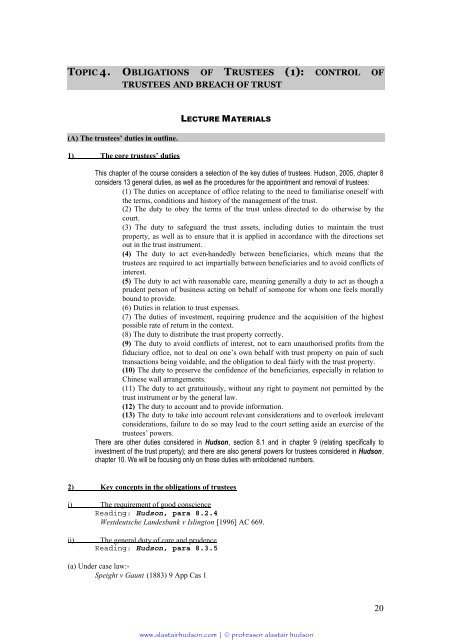Advanced Equity and Trusts Law - alastairhudson.com
Advanced Equity and Trusts Law - alastairhudson.com
Advanced Equity and Trusts Law - alastairhudson.com
Create successful ePaper yourself
Turn your PDF publications into a flip-book with our unique Google optimized e-Paper software.
TOPIC 4. OBLIGATIONS OF TRUSTEES (1): CONTROL OF<br />
TRUSTEES AND BREACH OF TRUST<br />
(A) The trustees’ duties in outline.<br />
1) The core trustees’ duties<br />
LECTURE MATERIALS<br />
This chapter of the course considers a selection of the key duties of trustees. Hudson, 2005, chapter 8<br />
considers 13 general duties, as well as the procedures for the appointment <strong>and</strong> removal of trustees:<br />
(1) The duties on acceptance of office relating to the need to familiarise oneself with<br />
the terms, conditions <strong>and</strong> history of the management of the trust.<br />
(2) The duty to obey the terms of the trust unless directed to do otherwise by the<br />
court.<br />
(3) The duty to safeguard the trust assets, including duties to maintain the trust<br />
property, as well as to ensure that it is applied in accordance with the directions set<br />
out in the trust instrument.<br />
(4) The duty to act even-h<strong>and</strong>edly between beneficiaries, which means that the<br />
trustees are required to act impartially between beneficiaries <strong>and</strong> to avoid conflicts of<br />
interest.<br />
(5) The duty to act with reasonable care, meaning generally a duty to act as though a<br />
prudent person of business acting on behalf of someone for whom one feels morally<br />
bound to provide.<br />
(6) Duties in relation to trust expenses.<br />
(7) The duties of investment, requiring prudence <strong>and</strong> the acquisition of the highest<br />
possible rate of return in the context.<br />
(8) The duty to distribute the trust property correctly.<br />
(9) The duty to avoid conflicts of interest, not to earn unauthorised profits from the<br />
fiduciary office, not to deal on one’s own behalf with trust property on pain of such<br />
transactions being voidable, <strong>and</strong> the obligation to deal fairly with the trust property.<br />
(10) The duty to preserve the confidence of the beneficiaries, especially in relation to<br />
Chinese wall arrangements.<br />
(11) The duty to act gratuitously, without any right to payment not permitted by the<br />
trust instrument or by the general law.<br />
(12) The duty to account <strong>and</strong> to provide information.<br />
(13) The duty to take into account relevant considerations <strong>and</strong> to overlook irrelevant<br />
considerations, failure to do so may lead to the court setting aside an exercise of the<br />
trustees’ powers.<br />
There are other duties considered in Hudson, section 8.1 <strong>and</strong> in chapter 9 (relating specifically to<br />
investment of the trust property); <strong>and</strong> there are also general powers for trustees considered in Hudson,<br />
chapter 10. We will be focusing only on those duties with emboldened numbers.<br />
2) Key concepts in the obligations of trustees<br />
i) The requirement of good conscience<br />
Reading: Hudson, para 8.2.4<br />
Westdeutsche L<strong>and</strong>esbank v Islington [1996] AC 669.<br />
ii) The general duty of care <strong>and</strong> prudence<br />
Reading: Hudson, para 8.3.5<br />
(a) Under case law:-<br />
Speight v Gaunt (1883) 9 App Cas 1<br />
www.<strong>alastairhudson</strong>.<strong>com</strong> | © professor alastair hudson<br />
20













